小学六年级英语【一般过去时的用法】
- 格式:doc
- 大小:56.50 KB
- 文档页数:7
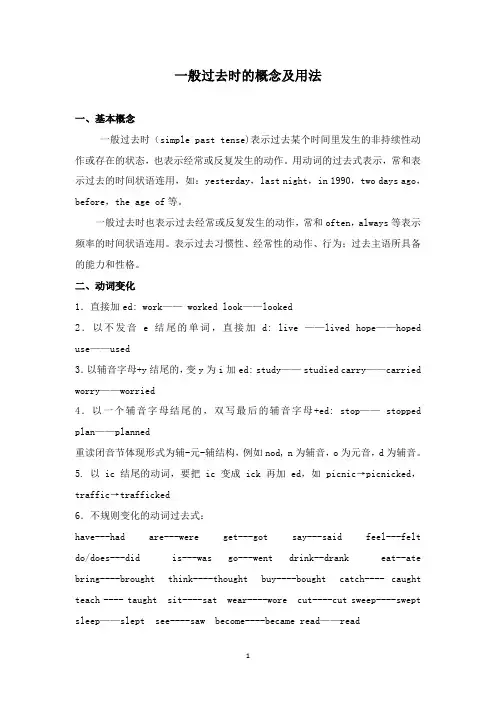
一般过去时的概念及用法一、基本概念一般过去时(simple past tense)表示过去某个时间里发生的非持续性动作或存在的状态,也表示经常或反复发生的动作。
用动词的过去式表示,常和表示过去的时间状语连用,如:yesterday,last night,in 1990,two days ago,before,the age of等。
一般过去时也表示过去经常或反复发生的动作,常和often,always等表示频率的时间状语连用。
表示过去习惯性、经常性的动作、行为;过去主语所具备的能力和性格。
二、动词变化1.直接加ed: work—— worked look——looked2.以不发音e结尾的单词,直接加d: live ——lived hope——hoped use——used3.以辅音字母+y结尾的,变y为i加ed: study——studied carry——carried worry——worried4.以一个辅音字母结尾的,双写最后的辅音字母+ed: stop—— stopped plan——planned重读闭音节体现形式为辅-元-辅结构,例如nod, n为辅音,o为元音,d为辅音。
5. 以ic结尾的动词,要把ic变成ick再加ed,如picnic→picnicked,traffic→trafficked6.不规则变化的动词过去式:have---had are---were get---got say---said feel---felt do/does---did is---was go---went drink--drank eat--ate bring----brought think----thought buy----bought catch---- caught teach ---- taught sit----sat wear----wore cut----cut sweep----swept sleep——slept see----saw become----became read——read7.以辅元辅结尾的加d三、用法(1)一般过去时表示在过去某个特定时间发生,也可以表示过去习惯性、经常性的动作。
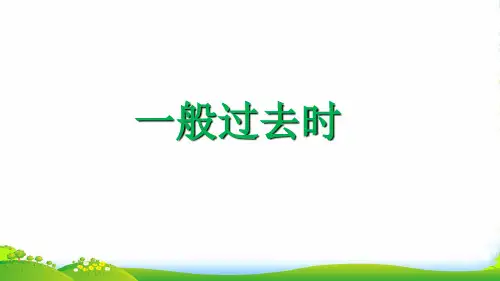
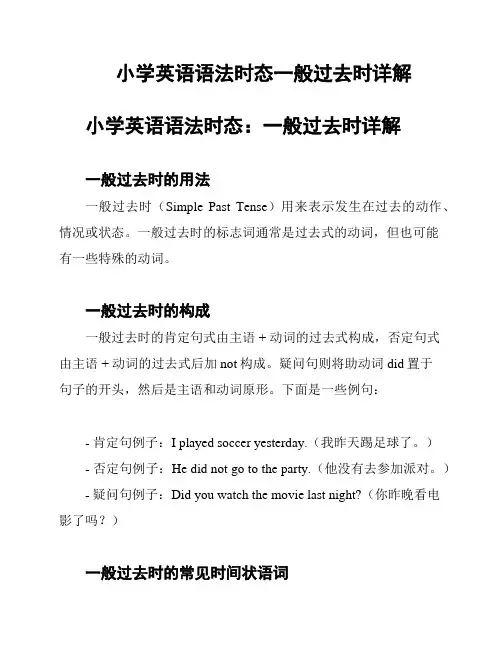
小学英语语法时态一般过去时详解小学英语语法时态:一般过去时详解一般过去时的用法一般过去时(Simple Past Tense)用来表示发生在过去的动作、情况或状态。
一般过去时的标志词通常是过去式的动词,但也可能有一些特殊的动词。
一般过去时的构成一般过去时的肯定句式由主语 + 动词的过去式构成,否定句式由主语 + 动词的过去式后加not构成。
疑问句则将助动词did置于句子的开头,然后是主语和动词原形。
下面是一些例句:- 肯定句例子:I played soccer yesterday.(我昨天踢足球了。
)- 否定句例子:He did not go to the party.(他没有去参加派对。
)- 疑问句例子:Did you watch the movie last night?(你昨晚看电影了吗?)一般过去时的常见时间状语词一般过去时通常会和一些时间状语词一起使用,以明确动作发生的具体时间。
以下是一些常见的时间状语词:- yesterday(昨天)- last week(上周)- two days ago(两天前)- in 1998(在1998年)一般过去时的特殊用法一般过去时有一些特殊的用法需要注意:1. 表示过去经常性的动作或惯。
例如:When I was young, I played soccer every day.(当我年轻时,我每天都踢足球。
)2. 表示过去事实或真理。
例如:The earth revolved around the sun.(地球绕太阳转。
)总结一般过去时用来描述发生在过去的动作、情况或状态。
它的构成简单,使用过去式的动词作为标志词。
通过加入时间状语词,可以更明确地指出动作发生的具体时间。
同时,一般过去时还有一些特殊的用法,需要灵活运用。
>注意:本文内容仅供参考,具体使用时请根据实际情况和教材要求进行调整。
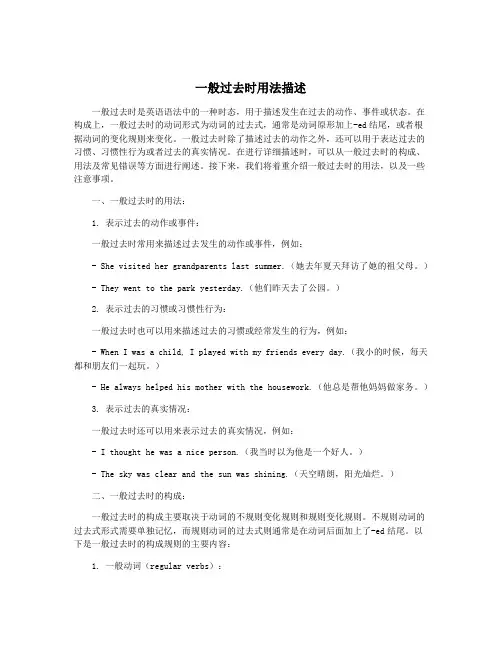
一般过去时用法描述一般过去时是英语语法中的一种时态,用于描述发生在过去的动作、事件或状态。
在构成上,一般过去时的动词形式为动词的过去式,通常是动词原形加上-ed结尾,或者根据动词的变化规则来变化。
一般过去时除了描述过去的动作之外,还可以用于表达过去的习惯、习惯性行为或者过去的真实情况。
在进行详细描述时,可以从一般过去时的构成、用法及常见错误等方面进行阐述。
接下来,我们将着重介绍一般过去时的用法,以及一些注意事项。
一、一般过去时的用法:1. 表示过去的动作或事件:一般过去时常用来描述过去发生的动作或事件,例如:- She visited her grandparents last summer.(她去年夏天拜访了她的祖父母。
)- They went to the park yesterday.(他们昨天去了公园。
)2. 表示过去的习惯或习惯性行为:一般过去时也可以用来描述过去的习惯或经常发生的行为,例如:- When I was a child, I played with my friends every day.(我小的时候,每天都和朋友们一起玩。
)- He always helped his mother with the housework.(他总是帮他妈妈做家务。
)3. 表示过去的真实情况:一般过去时还可以用来表示过去的真实情况,例如:- I thought he was a nice person.(我当时以为他是一个好人。
)- The sky was clear and the sun was shining.(天空晴朗,阳光灿烂。
)二、一般过去时的构成:一般过去时的构成主要取决于动词的不规则变化规则和规则变化规则。
不规则动词的过去式形式需要单独记忆,而规则动词的过去式则通常是在动词后面加上了-ed结尾。
以下是一般过去时的构成规则的主要内容:1. 一般动词(regular verbs):- 动词原形+ed结尾,例如:walked, talked, played等。
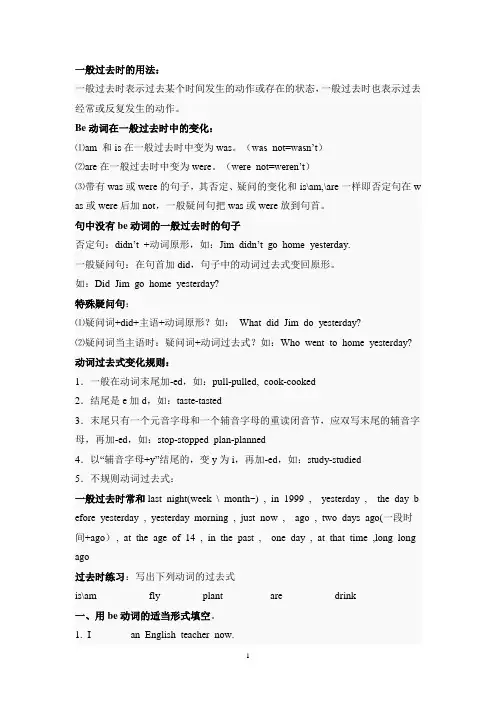
一般过去时的用法:一般过去时表示过去某个时间发生的动作或存在的状态,一般过去时也表示过去经常或反复发生的动作。
Be动词在一般过去时中的变化:⑴am 和is在一般过去时中变为was。
(was not=wasn’t)⑵are在一般过去时中变为were。
(were not=weren’t)⑶带有was或were的句子,其否定、疑问的变化和is\am,\are一样即否定句在w as或were后加not,一般疑问句把was或were放到句首。
句中没有be动词的一般过去时的句子否定句:didn’t +动词原形,如:Jim didn’t go home yesterday.一般疑问句:在句首加did,句子中的动词过去式变回原形。
如:Did Jim go home yesterday?特殊疑问句:⑴疑问词+did+主语+动词原形?如:What did Jim do yesterday?⑵疑问词当主语时:疑问词+动词过去式?如:Who went to home yesterday? 动词过去式变化规则:1.一般在动词末尾加-ed,如:pull-pulled, cook-cooked2.结尾是e加d,如:taste-tasted3.末尾只有一个元音字母和一个辅音字母的重读闭音节,应双写末尾的辅音字母,再加-ed,如:stop-stopped plan-planned4.以“辅音字母+y”结尾的,变y为i,再加-ed,如:study-studied5.不规则动词过去式:一般过去时常和last night(week \ month~) , in 1999 , yesterday , the day b efore yesterday , yesterday morning , just now , ago , two days ago(一段时间+ago), at the age of 14 , in the past , one day , at that time ,long long ago过去时练习:写出下列动词的过去式is\am_________ fly_______ plant________ are ________ drink___一、用be动词的适当形式填空。
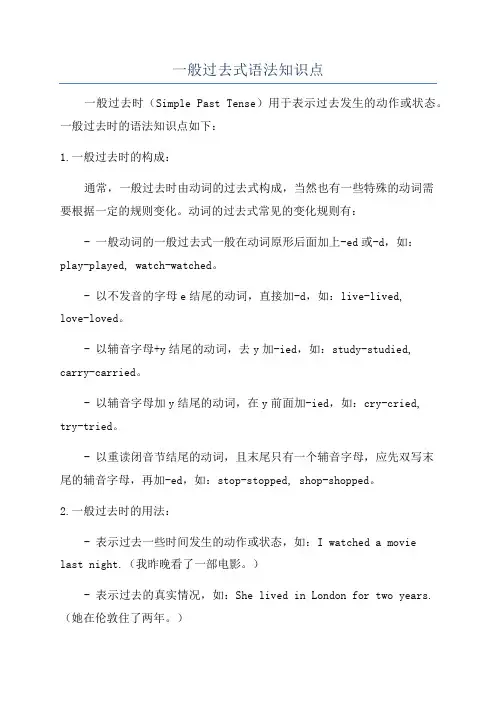
一般过去式语法知识点一般过去时(Simple Past Tense)用于表示过去发生的动作或状态。
一般过去时的语法知识点如下:1.一般过去时的构成:通常,一般过去时由动词的过去式构成,当然也有一些特殊的动词需要根据一定的规则变化。
动词的过去式常见的变化规则有:- 一般动词的一般过去式一般在动词原形后面加上-ed或-d,如:play-played, watch-watched。
- 以不发音的字母e结尾的动词,直接加-d,如:live-lived,love-loved。
- 以辅音字母+y结尾的动词,去y加-ied,如:study-studied, carry-carried。
- 以辅音字母加y结尾的动词,在y前面加-ied,如:cry-cried,try-tried。
- 以重读闭音节结尾的动词,且末尾只有一个辅音字母,应先双写末尾的辅音字母,再加-ed,如:stop-stopped, shop-shopped。
2.一般过去时的用法:- 表示过去一些时间发生的动作或状态,如:I watched a movielast night.(我昨晚看了一部电影。
)- 表示过去的真实情况,如:She lived in London for two years.(她在伦敦住了两年。
)3.一般过去时的否定形式和疑问形式:- 否定形式:在助动词did之后加not,再接动词原形,如:I did not go to the party.(我没有参加聚会。
)- 疑问形式:将助动词did放在句首,直接将主语提前,后面接动词原形,如:Did you finish your homework?(你完成作业了吗?)4.一般过去时的时间状语:一般过去时常与表示过去的时间状语连用,如:yesterday(昨天),last week(上周),in 1990(在1990年),等等。
5.一般过去时的特殊情况:一些动词在一般过去时的用法有一些特殊情况,如:- be动词的一般过去时变化为was或were,如:I was tired yesterday.(昨天我很累。
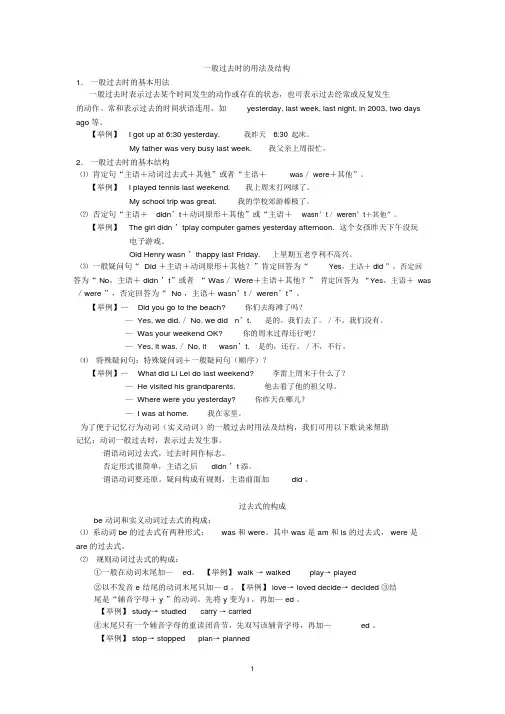
一般过去时的用法及结构1.一般过去时的基本用法一般过去时表示过去某个时间发生的动作或存在的状态,也可表示过去经常或反复发生的动作。
常和表示过去的时间状语连用,如yesterday, last week, last night, in 2003, two days ago 等。
【举例】I got up at 6:30 yesterday.我昨天6:30起床。
My father was very busy last week.我父亲上周很忙。
2.一般过去时的基本结构⑴肯定句“主语+动词过去式+其他”或者“主语+was/ were+其他”。
【举例】I played tennis last weekend.我上周末打网球了。
My school trip was great.我的学校郊游棒极了。
⑵否定句“主语+didn’t+动词原形+其他”或“主语+wasn’t/ weren’t+其他”。
【举例】The girl didn ’tplay computer games yesterday afternoon. 这个女孩昨天下午没玩电子游戏。
Old Henry wasn ’thappy last Friday.上星期五老亨利不高兴。
⑶一般疑问句“ Did +主语+动词原形+其他?”肯定回答为“Yes,主语+ did ”,否定回答为“ No,主语+ didn ’t”或者“ Was/ Were+主语+其他?”肯定回答为“Yes,主语+was /w ere ”,否定回答为“ No ,主语+ wasn’t/ weren’t”。
【举例】—Did you go to the beach?你们去海滩了吗?— Yes, we did./ No, we did n’t.是的,我们去了。
/不,我们没有。
— Was your weekend OK?你的周末过得还行吧?— Yes, it was./ No, it wasn’t.是的,还行。
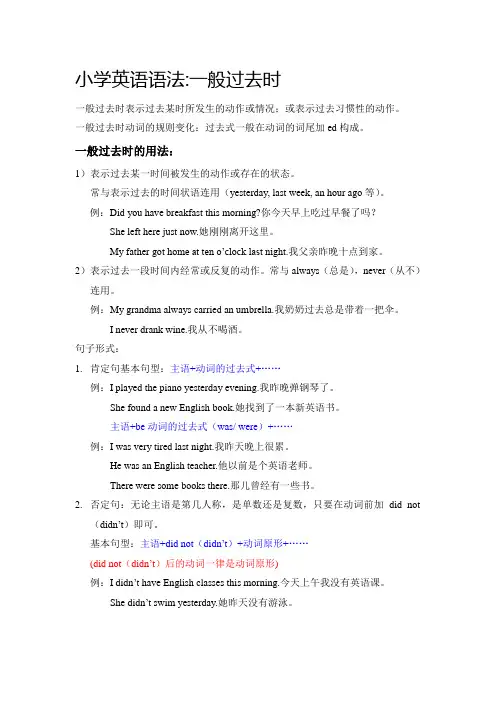
小学英语语法:一般过去时一般过去时表示过去某时所发生的动作或情况;或表示过去习惯性的动作。
一般过去时动词的规则变化:过去式一般在动词的词尾加ed构成。
一般过去时的用法:1)表示过去某一时间被发生的动作或存在的状态。
常与表示过去的时间状语连用(yesterday, last week, an hour ago等)。
例:Did you have breakfast this morning?你今天早上吃过早餐了吗?She left here just now.她刚刚离开这里。
My father go t home at ten o’clock last night.我父亲昨晚十点到家。
2)表示过去一段时间内经常或反复的动作。
常与always(总是),never(从不)连用。
例:My grandma always carried an umbrella.我奶奶过去总是带着一把伞。
I never drank wine.我从不喝酒。
句子形式:1.肯定句基本句型:主语+动词的过去式+……例:I played the piano yesterday evening.我昨晚弹钢琴了。
She found a new English book.她找到了一本新英语书。
主语+be动词的过去式(was/ were)+……例:I was very tired last night.我昨天晚上很累。
He was an English teacher.他以前是个英语老师。
There were some books there.那儿曾经有一些书。
2.否定句:无论主语是第几人称,是单数还是复数,只要在动词前加did not(didn’t)即可。
基本句型:主语+did not(didn’t)+动词原形+……(did not(didn’t)后的动词一律是动词原形)例:I didn’t have English classes this morning.今天上午我没有英语课。
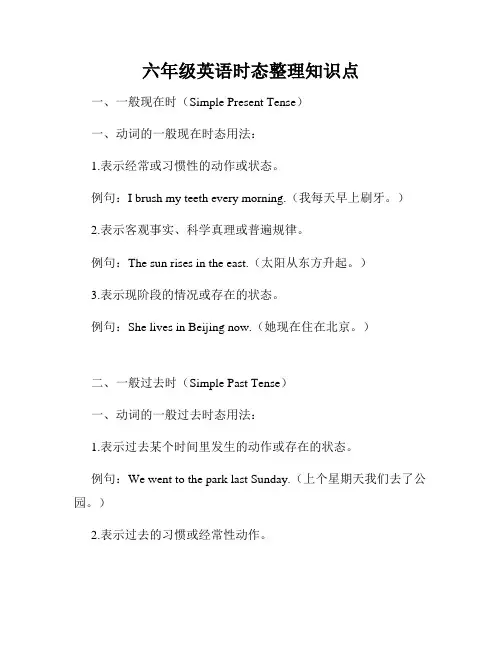
六年级英语时态整理知识点一、一般现在时(Simple Present Tense)一、动词的一般现在时态用法:1.表示经常或习惯性的动作或状态。
例句:I brush my teeth every morning.(我每天早上刷牙。
)2.表示客观事实、科学真理或普遍规律。
例句:The sun rises in the east.(太阳从东方升起。
)3.表示现阶段的情况或存在的状态。
例句:She lives in Beijing now.(她现在住在北京。
)二、一般过去时(Simple Past Tense)一、动词的一般过去时态用法:1.表示过去某个时间里发生的动作或存在的状态。
例句:We went to the park last Sunday.(上个星期天我们去了公园。
)2.表示过去的习惯或经常性动作。
例句:He always played football when he was young.(他年轻时总是踢足球。
)三、一般将来时(Simple Future Tense)一、动词的一般将来时态用法:1.表示将来某个时间内将要发生的动作或存在的状态。
例句:I will go to the beach next weekend.(下周末我会去海滩。
)2.表示将来的打算、意图或预测。
例句:She is going to be a doctor in the future.(她将来会成为一名医生。
)四、现在进行时(Present Continuous Tense)一、动词的现在进行时态用法:1.表示现在进行的动作。
例句:I am studying for the exam at the moment.(我正在复习考试。
)2.表示现阶段的变化、发展或趋势。
例句:The population of the city is increasing rapidly.(这个城市的人口正在迅速增长。
)五、过去进行时(Past Continuous Tense)一、动词的过去进行时态用法:1.表示过去某个时间里正在进行的动作。
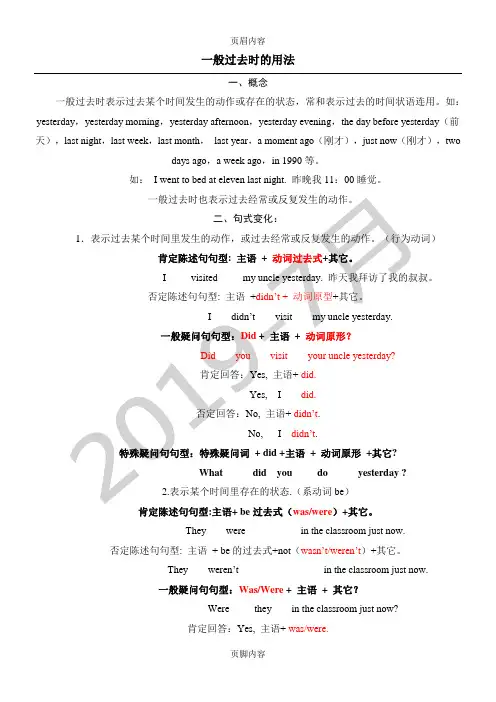
一般过去时的用法一、概念一般过去时表示过去某个时间发生的动作或存在的状态,常和表示过去的时间状语连用。
如:yesterday,yesterday morning,yesterday afternoon,yesterday evening,the day before yesterday(前天),last night,last week,last month,last year,a moment ago(刚才),just now(刚才),twodays ago,a week ago,in 1990等。
如:I went to bed at eleven last night. 昨晚我11:00睡觉。
1肯定陈述句句型: 主语I visited否定陈述句句型: 主语+I didn’tvisit your uncle yesterday?主语+ did.I did.主语+ didn’t.I didn’t.主语+ 动词原形+其它?you do yesterday ?.(系动词be)肯定陈述句句型:主语+ be过去式(was/were)+其它。
They were in the classroom just now.否定陈述句句型: 主语+ be的过去式+not(wasn’t/weren’t)+其它。
They weren’t in the classroom just now.一般疑问句句型:Was/Were + 主语+ 其它?Were they in the classroom just now?肯定回答:Yes, 主语+ was/were.Yes, they were.否定回答:No, 主语+ wasn’t/weren’t.No, they weren’t.特殊疑问句句型:特殊疑问词+ was /were+主语+其它?Where were they just now?三、动词过去式的构成规律(一)规则动词的过去式1.以不发音e结尾的动词,在词尾直接加2.以“辅音字母+ ystudy→studied, tr3.以重读闭音节(即辅音+元音+辅音)或r写这个辅音字母后,再加–ed。
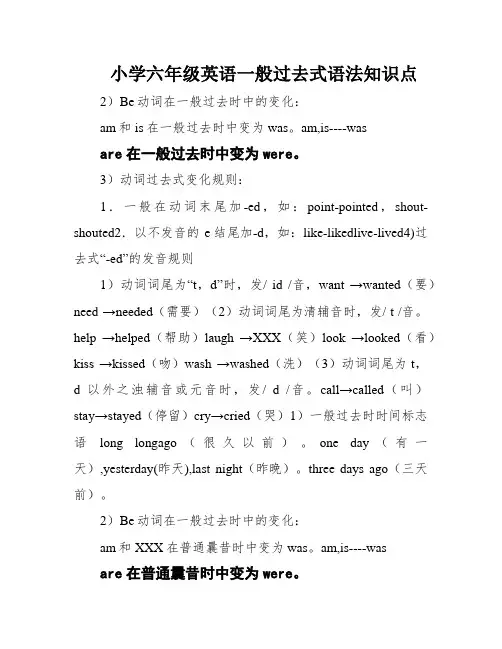
小学六年级英语一般过去式语法知识点2)Be动词在一般过去时中的变化:am和is在一般过去时中变为was。
am,is----wasare在一般过去时中变为were。
3)动词过去式变化规则:1.一般在动词末尾加-ed,如:point-pointed,shout-shouted2.以不发音的e结尾加-d,如:like-likedlive-lived4)过去式“-ed”的发音规则1)动词词尾为“t,d”时,发/ id /音,want →wanted(要)need →needed(需要)(2)动词词尾为清辅音时,发/ t /音。
help →helped(帮助)laugh →XXX(笑)look →looked(看)kiss →kissed(吻)wash →washed(洗)(3)动词词尾为t,d以外之浊辅音或元音时,发/ d /音。
call→called(叫)stay→stayed(停留)cry→cried(哭)1)一般过去时时间标志语long longago(很久以前)。
one day(有一天),yesterday(昨天),last night(昨晚)。
three days ago(三天前)。
2)Be动词在一般过去时中的变化:am和XXX在普通曩昔时中变为was。
am,is----wasare在普通曩昔时中变为were。
3)动词过去式变化规则:1.普通在动词末尾加-ed,如:point-pointed,shout-shouted2.以不发音的e结尾加-d,如:like-likedlive-lived4)曩昔式“-ed”的发音划定规矩1)动词词尾为“t,d”时,发/ id /音,want →wanted(要)need →needed(需求)(2)动词词尾为清子音时,发/ t /音。
help →helped(帮助)laugh →XXX(笑)look →looked(看)kiss →kissed(吻)wash →washed(洗)(3)动词词尾为t,d以外之浊子音或元音时,发/ d /音。
一般过去时讲解一. 概念一般过去时表示过去某一时间发生的动作或存在的状态。
常和yesterday, last week(year), three days(weeks) ago,in 2003等时间状语连用。
二.一般过去时有下面三种用法:1.表示过去的动作或状态:I bought the hat yesterday.昨天我买了这顶帽子。
He was at school last Monday.上星期一他在上学。
2.表示过去的习惯动作:When he was at school, he wrote a dairy every day.他上学时,每天写一篇日记。
I used to get up early.我以前习惯早起。
注:"used to+动词原形"表示过去某一段时间内有规律的习惯。
3.表示过去发生的一连串的动作:The students got up early in the morning, did their morning exercise, fetched water, swept the floor and then studied English.学生们一早起来,做早操,打水,扫地,然后学英语。
三. 构成(1)主语+be动词(was,were)+其它。
当主语为第一、三人称单数时,be动词用was,主语为其它人称时,be 动词一律用were。
如:I(He, She) was in Grade 5 last year.They were students two years ago.(2) 主语+行为动词过去式(无人称和数的变化)。
如:We played football yesterday. Mr Li went to Shanghai last Sunday.3.变化形式:A.一般在动词词尾加ed。
例如:play—played clean—cleaned visit—visitedB.动词末尾字母是e的,在e后直接加d。
一般过去时的用法及常见句型总结一般过去时是英语中最常用的过去时态之一,用于表示过去发生或已经完成的动作、事件或状态。
本文将总结一般过去时的用法,并给出一些常见的句型。
一、一般过去时的构成在一般过去时,动词通常以过去式形式出现。
对于大多数动词,过去式是在动词原形后加上-ed或-d。
然而,有一些动词过去式形式是不规则的,需要进行记忆。
例如:1. Regular verbs(规则动词)walk → walked(走→ 走过)talk → talked(说话→ 说过)2. Irregular verbs(不规则动词)go → went(去→ 去过)eat → ate(吃→ 吃过)二、一般过去时的用法1. 表示过去的动作或事件- I read a book last night.(昨晚我读了一本书)- They went to the cinema yesterday.(他们昨天去了电影院)- She cooked dinner for her family.(她为家人做饭)2. 表示过去的习惯或常态- We always played basketball after school.(我们放学后经常打篮球) - He used to live in Paris.(他过去住在巴黎)- She would often visit her grandparents.(她经常去看望她的祖父母)3. 用于时间状语从句一般过去时可以与一些表示过去的时间状语连用,如yesterday(昨天)、last week(上周)、in 2005(在2005年)等。
- I saw him yesterday.(我昨天见到了他)- She called me last night.(她昨晚给我打电话了)- They visited the museum in 2005.(他们在2005年参观了博物馆)4. 否定句和疑问句的构成在一般过去时的否定句和疑问句中,需要使用助动词did,并且动词恢复成原形。
一般过去时知识点大全小学一般过去时是英语中最常用的时态之一,用来表示过去发生或存在的动作、状态或习惯。
在小学阶段,学生需要掌握一般过去时的基本用法和规则,以便正确运用。
下面是一般过去时知识点的详细介绍:1. 一般过去时的构成:一般过去时是通过在动词原形后面直接加上“-ed”来构成的。
例如:play→played,paint→painted。
2. 一般过去时的肯定句:一般过去时的肯定句的结构是:主语 + 动词过去式 + 其他。
例如:I played soccer with my friends yesterday.我昨天和我的朋友们踢足球。
3. 一般过去时的否定句:一般过去时的否定句的结构是:主语 + did not + 动词原形 + 其他。
例如:We did not watch a movie last night.我们昨晚没看电影。
4. 一般过去时的疑问句:一般过去时的疑问句的结构是:Did + 主语 + 动词原形 + 其他?例如:Did you eat breakfast this morning?你今天早上吃早饭了吗?5. 一般过去时中的时间状语词:一般过去时通常与过去的时间状语词连用,表示动作或事件发生的具体时间。
例如:yesterday(昨天)、last week(上周)、two days ago(两天前)等。
6. 一般过去时中的特殊动词:一般过去时中有一些特殊的动词形式需要注意:- be动词的过去式形式是was(单数第一人称和单数第三人称)和were(其他人称和复数形式)。
- do动词的过去式形式是did。
7. 一般过去时中的规则动词和不规则动词:在一般过去时中,大部分动词都是按照规则进行变化的,即直接在动词原形后加上“-ed”。
而一些常见的动词则有自己的过去式形式,需要记住,其中包括go(went)、see(saw)、eat(ate)等。
8. 一般过去时与现在时态的对比:一般过去时表示的是过去发生的动作或状态,与现在时态形成对比。
一般过去时的用法一、概念表示在的过去某个时间里所发生的动作或存在的状态。
通常在句子里找到表示过去时间的词或词组。
如:yesterday,yesterday morning,yesterday afternoon,yesterday evening,the day before yesterday(前天),last night,last week,last month,last year,a momentago(刚才),just now(刚才),two days ago,a week ago,in 1990等。
如:I went to bed at eleven last night.昨晚我11:00睡觉。
四、动词过去式的构成规律(一)规则动词的过去式1.一般情况下,在动词原形后面加-ed;look→lookedplay→playedstart→startedvisit→visited2.以不发音e结尾的动词,在词尾直接加-d;live→liveduse→used3.以“辅音字母+ y”结尾的动词,先将y改为i ,再加–ed;study→studied, try→triedfly→flied4.以重读闭音节(即辅音+元音+辅音)或r音节结尾,末尾只有一个辅音字母的动词,要先双写这个辅音字母后,再加–ed。
stop→stoppedplan→planned, prefer→preferred(二)不规则动词的过去式1.改变动词中的元音;begin→begandrink→drankcome→cameeat→ategrow→grewrun→ranknow→kn ewwin→wonspeak→spoketake→tookwrite→wroteget→got2.变词尾的–d为–t;build→builtlend→lentsend→sentspend→spentbend→bent3.与动词原形一样;cut→cutput→putcost→costhurt→hurtshut→shut4.变-ay为-aid (少数动词);say→saidpay→paidlay→laid5.采用不同词根;sell→soldteach→taughtbuy→bought6.其他。
小学六年级一般过去时简单总结一般过去时1.一般过去时表示过去某个时间发生的动作或存在的状态,常和表示过去的时间状语连用。
如:last week , last year , yesterday 等,也可以表示过去经常发生的动作,常和often,always 等频率副词连用。
例如:I saw him in the supermarket yesterday. 昨天我在超市里看见他了。
Mike always went to school on foot last term. 上学期迈克总是步行上学。
2.句型:询问在过去的某一个时间做了什么,借助助动词did 。
特殊疑问句——What did you do yesterday / last weekend ? ——I did my homework .一般疑问句,把did提前——Did you help your parents clean the room ? ( 当句子变为一般疑问句,动词应还原成动词原形) ——Yes , I did ./No, I didn’t .一般过去时1. 一般过去时表示过去某个时间发生的动作或存在的状态,常和表示过去的时间状语连用。
如:last week , last year , yesterday 等,也可以表示过去经常发生的动作,常和often,always 等频率副词连用。
例如:I saw him in the supermarket yesterday. 昨天我在超市里看见他了。
Mike always went to school on foot last term. 上学期迈克总是步行上学。
2.句型:询问在过去的某一个时间做了什么,借助助动词did 。
特殊疑问句——What did you do yesterday / last weekend ? ——I did my homework .一般疑问句,把did提前——Did you help your parents clean the room ? ( 当句子变为一般疑问句,动词应还原成动词原形) ——Yes , I did ./No, I didn’t .。
一般过去时1.一般过去时表示过去某个时间发生的动作或存在的状态,常和表示过去的时间状语连用。
如:last week , last year , yesterday 等,也可以表示过去经常发生的动作,常和often,always 等频率副词连用。
例如:I saw him in the supermarket yesterday. 昨天我在超市里看见他了。
Mike always went to school on foot last term. 上学期迈克总是步行上学。
2.句型:询问在过去的某一个时间做了什么,借助助动词did 。
特殊疑问句——What did you do yesterday / last weekend ? ——I did my homework .一般疑问句,把did提前——Did you help your parents clean the room ? ( 当句子变为一般疑问句,动词应还原成动词原形) ——Yes , I did ./No, I didn’t .一般过去时1. 一般过去时表示过去某个时间发生的动作或存在的状态,常和表示过去的时间状语连用。
如:last week , last year , yesterday 等,也可以表示过去经常发生的动作,常和often,always 等频率副词连用。
例如:I saw him in the supermarket yesterday. 昨天我在超市里看见他了。
Mike always went to school on foot last term. 上学期迈克总是步行上学。
2.句型:询问在过去的某一个时间做了什么,借助助动词did 。
特殊疑问句——What did you do yesterday / last weekend ? ——I did my homework .一般疑问句,把did提前——Did you help your parents clean the room ? ( 当句子变为一般疑问句,动词应还原成动词原形) ——Yes , I did ./No, I didn’t .。
一般过去时的用法一、概念表示在的过去某个时间里所发生的动作或存在的状态。
通常在句子里找到表示过去时间的词或词组。
如:yesterday,yesterday morning,yesterday afternoon,yesterday evening,the day before yesterday(前天),last night,last week,last month,last year,a moment ago(刚才),just now(刚才),two days ago,a week ago,in 1990等。
如:I went to bed at eleven last night. 昨晚我11:00睡觉。
四、动词过去式的构成规律(一)规则动词的过去式1.一般情况下,在动词原形后面加-ed;look→looked play→played start→started visit→visited2.以不发音e结尾的动词,在词尾直接加-d;live→lived use→used3.以“辅音字母+ y”结尾的动词,先将y 改为i ,再加–ed;study→studied, t ry→tried fly→flied4.以重读闭音节(即辅音+元音+辅音)或r音节结尾,末尾只有一个辅音字母的动词,要先双写这个辅音字母后,再加–ed。
stop→stopped plan→planned, prefer→preferred(二)不规则动词的过去式1.改变动词中的元音;begin→began drink→drank come→came eat→ate grow→grew run→ran know→knew win→won speak→spoke take→too k write→wrote get→got2.变词尾的–d 为–t ;build→built lend→lent send→sent spend→spent bend→bent3.与动词原形一样;cut→cut put→put cost→cost hurt→hurt shut→shut4.变-ay 为-aid (少数动词);say→said pay→paid lay→laid5.采用不同词根;sell→sold teach→taught buy→bought6.其他。
am/is→was are→were have/has→had do→did五、加“-ed”后的读音方法1.ed加在清辅音后面读/t/。
finished /-t/ help /-t/ asked /-t/2.ed加在浊辅音或元音结尾的,读/d/。
played /-d/ lived /-d/ enjoyed /-d/3.ed加在/t/或/d/后面,读/id/。
wanted /-tid/ needed /-did/ visited /-tid/六、句式变化(一)一般过去时的一般疑问句1.把was, were放在句首,其余位置不变。
由Was…?引导的一般疑问句,肯定答为:Yes,… was. 否定回答为:No,…. wasn’t. 由Were…?引导的一般疑问句,肯定回答为:Yes,… were. 否定回答为:No,… weren’t.如:(1)I was born in Shanghai. →Were you born in Shanghai?→Yes, I was. (肯定回答) →No, I wasn’t. (否定回答)(2)They were in Li Yan’s home last night. →Were they in Li Yan’s home last night?→Yes, they were. (肯定回答) →No, they weren’t. (否定回答)2.在行为动词的句子中,要用助动词词did来引导,其余的语序不变。
要注意的是,要把行为动词的过去式改为原形。
肯定回答为:Yes, …did. 否定回答:No, …didn’t.如:John played computer games last night.→Did John play computer games last night?→Yes, he did. (肯定回答) →No, he didn’t. (否定回答)(二)一般过去时的否定句1.在表示过去存在的状态的句子中,相接在was, were的后面加上not。
如:(1)He was in the park the day before yesterday.→He was not in the park the day before yesterday.(2)We were busy last week.→We were not busy last week.2.在表示过去的时间发生的动作的句子中,要在行为动词的前面加助动词didn’t.然后把过去式的行为动词改为动词原形。
即:didn’t + 动词原形。
如:(1)She played the violin last night.→She didn’t play the violin last night.(2)They swam in the lake yesterday.→They didn’t swim in the lake yesterday.(三)、一般过去式的特殊疑问句1.What did …?(主要是询问过去发生了什么事情,注意要把过去式改为动词原形。
)We ate Chinese food last night.→What did we eat last night?2.Where did ?( 主要是询问过去事情发生的地方。
)They sang and dance in the music room yesterday morning.→Where did they sing and dance yesterday morning?3.Who + 动词过去式…?( 主要是询问过去事情发生的人物。
)Mike and Tom climbed mountains last weekend.→Who climbed mountains last weekend?二、句子结构1.在表示某个时间里存在的状态的句子,系动词用过式was,were构成。
如:(1)I was at home yesterday.昨天我在家。
(2)We were in the gym just now. 刚才我们在体育馆。
2.在表示过去某个时间里发生的动作,用动词的过去式构成。
如:I visited my uncle yesterday. 昨天我拜访了我的叔叔。
3.各种句式(1)一般过去时的肯定陈述句:主语+动词过去式+宾语或表语。
He worked in Shanghai ten years ago.(2)一般过去时的否定句:a.主语+didn’t +动词原形+宾语。
(did + not = didn't)He didn't do morning exercises yesterday.b.主语+wasn’t/weren’t +表语。
(was + not = wasn't were + not = weren't) He wasn't an English teacher ten years ago.(3)一般过去时的一般疑问句:a.Did +主语+动词原形+宾语?Did you study English in 1990 ?b.Was/Were + 主语+表语?Was he a pupil five years ago ?(4)一般过去时的特殊疑问句:a.特殊疑问词+did + 主语+动词原形+宾语?Where did your parents live five years ago?What did you do last Sunday?b.特殊疑问词+were/was +表语?Who was at the zoo yesterday?过去时练习:写出下列动词的过去式is\am_________ fly_______ plant________ are ________ drink_________play_______ go________ make ________ does_________ dance________worry________ ask _____ taste_________ eat__________ draw________put ______ throw________ kick_________ pass_______ do ________练习:一.用所给动词的适当形式填空。
1. We ______ (live) in Japan last year.2. Susan_______ (stop) the car on the street yesterday.3. My mother_______ (clean) my room and ______(study) for the English test last Sunday.4. What ______ you ______(do) last night?5. On Saturday morning I _____(play) football.二.用括号内所给动词的适当形式填空。
(1) May__________ (finish) her homework very late yesterday evening.(2) Han Mei __________ (bring) her pet to the park that day.(3) His father __________ (buy) a new computer for him last week.(4) Miss Du__________ (walk) to work every day last term.(5) We __________ (move) to Shenyang 8 years ago.(6) __________ you __________ (have) bread for breakfast this morning?(7) She __________ (give) me a nice present last night.(8) The police __________ (stop) the car and __________ (catch) the thief (小偷) just now.(9) Tom __________ (carry) water for the old man last Saturday.(10)Uncle Wang _____________ ( come )into the room and __________ ( find ) something to eat.(11).Lily ______________ ( study ) in the classroom for two hours and then _________ ( leave ).(12).Jimmy __________ ( do ) a lot today. He _________ ( go ) shopping and ________ ( cook ) supper.(13).We _________ ( go ) to the cinema last night. The film ___________ ( be ) very good.(14).What time _________ you __________ ( get ) to school this morning?过去时练习一1. I ______ (watch) a cartoon on Saturday.2. Her father _______ (read) a newspaper last night.3. We _________ to zoo yesterday, we _____ to the park. (go)4. ______ you _______ (visit) your relatives last Spring Festival?5. ______ he _______ (fly) a kite on Sunday? Yes, he ______.6. Gao Shan _______ (pull) up carrots last National Day holiday.7. I ____________ (sweep) the floor yesterday, but my mother ______.8. What ______ she _______ (find) in the garden last morning? She __________ (find) a beautiful butterfly.二、用动词的适当形式填空1. It ______ (be) Ben’s birthday last Friday.2. We all ______ (have) a good time last night.3. He ________ (jump) high on last Sports Day.4. Helen ________ (milk) a cow on Friday.5. She likes ______ newspapers, but she ______ a book yesterday. (read)6. He _______ football now, but they _______ basketball just now. (play)7. Jim’s mother _________ (plant) trees just now.8. _______ they ________ (sweep) the floor on Sunday? No, they _____.9. I _______ (watch) a cartoon on Monday.10. We ___________ (go) to school on Sunday.一、用行为动词的适当形式填空1. He _________ (live) in Wuxi two years ago.2. The cat ________ (eat) a bird last night.3. We _______ (have) a party last Halloween.4. Nancy ________ (pick) up oranges on the farm last week.5. I ________ (make) a model ship with Mike yesterday.6. They ________ (play) chess in the classroom last PE lesson.7. My mother _______ (cook) a nice food last Spring Festival.8. The girls ________ (sing) and _______ (dance) at the party.三、用动词的适当形式填空1. It ______ (be) Ben’s birthday last Friday.2. We all ______ (have) a good time last night.3. He ________ (jump) high on last Sports Day.4. Helen ________ (milk) a cow on Friday.5. She likes ______ newspapers, but she ______ a book yesterday. (read)6. He _______ football now, but they _______ basketball just now. (play)7. Jim’s mother _________ (plant) trees just now.8. _______ they ________ (sweep) the floor on Sunday? No, they _____.9. I _______ (watch) a cartoon on Monday.10. We ___________ (go) to school on Sunday.四、用动词的适当形式填空1. It _____ (be) the 2nd of November yesterday.Mr White ________ (go) to his office by car.2. Gao Shan ________ (put) the book on his head a moment ago.3. Don’t ______ the house. Mum _______ i t yesterday. (clean)4. What ____ you ______ just now? I _______ some housework. (do)5. They _________ (make) a kite a week ago.6. I want to ______ apples. But my dad _______ all of them last month. (pick)7. _______ he ______ the flowers this morning? Yes, he _____. (water)8. She ____ (be) a pretty girl. Look, she _____ (do) Chinese dances.9. The students often ______ (draw) some pictures in the art room.10.What ______ Mike do on the farm? He ________ cows. (milk)五.用一般过去时填空1、I ________(go) to the cinema last Saturday.2、He______ (is ) ill yesterday.3、We _______ (have ) a lesson yesterday.4、What ___your uncle ____(do) yesterday morning? He _(read ) English.5、She ______ (clean) our classroom yesterday afternoon.。